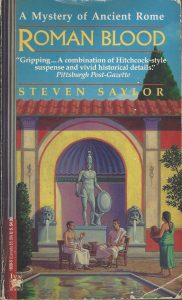As I said yesterday, the discovery of a missing datum threw some of the conclusions of recent posts into doubt. As of now I have updated those posts with correct information. The affected posts are listed below:
All of these posts have been amended and may now be read with the confidence that you bring to anything you read on the Interwebs.
Warning: The following contains moderately technical details which some readers may find boring and others will find overly simplified.
The problem began almost a year-and-a-half ago, when I read the sequel to the historical mystery Roman Blood by Steven Saylor. (This compelling novel is a fictional retelling of the events behind Cicero’s first major trial, which the Roman advocate published as Pro Roscio Amerino. Saylor effectively blends facts from the trial record with speculation well founded in the known ancient history of urbs Roma, in a novel that is obviously a long-planned labor of love.) Back in 2015 I began tracking which books in my library I had actually read — not in the actual book record, but in a related table, “Notes” — by simply recording that a book was ‘read yyyy-mm-dd‘, where yyyy-mm-dd was replaced with the actual date I finished the book. Though this table has a “Read” field (which the UI displays as a checkbox), that binary field is not easily searched, so it was the text field which was later used in the query identifying finished books. This “Notes” text field was also used for sorting the books in the order completed, where the date format made such ordering simple using an alphabetic sort.
(This compelling novel is a fictional retelling of the events behind Cicero’s first major trial, which the Roman advocate published as Pro Roscio Amerino. Saylor effectively blends facts from the trial record with speculation well founded in the known ancient history of urbs Roma, in a novel that is obviously a long-planned labor of love.) Back in 2015 I began tracking which books in my library I had actually read — not in the actual book record, but in a related table, “Notes” — by simply recording that a book was ‘read yyyy-mm-dd‘, where yyyy-mm-dd was replaced with the actual date I finished the book. Though this table has a “Read” field (which the UI displays as a checkbox), that binary field is not easily searched, so it was the text field which was later used in the query identifying finished books. This “Notes” text field was also used for sorting the books in the order completed, where the date format made such ordering simple using an alphabetic sort. During the most recent hundred books I finally created a specific field (two, in fact) for enumerating the book read order, and had to go back and update all of the previous records with that information, but I still used the “Notes” table for recording the actual date read. So my mistake was the following: after reading the short story collection Eight Strange Tales after finishing the historical mystery mentioned above, I read the next Steven Saylor novel in that series, and forgot to record its completion in the “Notes” table. From that mistake flowed all of the dire consequences which followed in its wake.
During the most recent hundred books I finally created a specific field (two, in fact) for enumerating the book read order, and had to go back and update all of the previous records with that information, but I still used the “Notes” table for recording the actual date read. So my mistake was the following: after reading the short story collection Eight Strange Tales after finishing the historical mystery mentioned above, I read the next Steven Saylor novel in that series, and forgot to record its completion in the “Notes” table. From that mistake flowed all of the dire consequences which followed in its wake.
As I said, I later began recording the ordinal for each book read, and had to retcon that data for all the earlier books. (In fact, I record two datapoints, one for every book, and a second for those non-comics books completed, since I exclude comics and graphic novels from my books read totals.) But since I forgot to ‘note’ (hee-hee again) that I’d finished Arms Of Nemesis, the 2nd novel in Saylor’s series about Gordianus the Finder, not only were my ordinal counts off by 1, but this novel did not appear in any of my queries regarding finished books. (As an aside, I note that Arms Of Nemesis was the 150th book read since I began tracking this data, and the 117th non-comic book read. Thus the vast majority of the last hundred books read were affected by this problem.) It is only by fortune that I was able to reconstruct this data, however. I began rating my books as I read them, and I rated the second Saylor novel. This rating meant that the “Date Modified” field had the timestamp correlating to the date I finished the book, and thus I was able to reconstruct the data. However, if I had later changed any datum about that book — which I have been doing on a large scale, as I normalize genre information across the database — I would have changed the “Date Modified” field and would have been unable to determine just when I completed that novel, knowing only that I’d read it after the first in the series. So we dodged a bullet there.
But since I forgot to ‘note’ (hee-hee again) that I’d finished Arms Of Nemesis, the 2nd novel in Saylor’s series about Gordianus the Finder, not only were my ordinal counts off by 1, but this novel did not appear in any of my queries regarding finished books. (As an aside, I note that Arms Of Nemesis was the 150th book read since I began tracking this data, and the 117th non-comic book read. Thus the vast majority of the last hundred books read were affected by this problem.) It is only by fortune that I was able to reconstruct this data, however. I began rating my books as I read them, and I rated the second Saylor novel. This rating meant that the “Date Modified” field had the timestamp correlating to the date I finished the book, and thus I was able to reconstruct the data. However, if I had later changed any datum about that book — which I have been doing on a large scale, as I normalize genre information across the database — I would have changed the “Date Modified” field and would have been unable to determine just when I completed that novel, knowing only that I’d read it after the first in the series. So we dodged a bullet there.
Fortunately, I realized that this book had been read before making any other changes. Thus order has been restored to this small, petty universe. I am attempting to normalize and correct information in the database — particularly genre information, so that I can have a standard set of categories and also call out the specialty categories which apply to my own personal collection of books. These include such groupings as “Secret Societies” and “Shakespeare Wacko”. The off-the-shelf software I use for cataloguing my books is nice because I can simple enter new books by ISBN, but the information is garnered from online databases which have their own issues and idiosyncrasies. For a while, for example, UK databases were being searched first, so prices in pounds sterling (£) were often entered automatically. (I also strive to enter the price actually shown on the book, not the price I pay, which is often different given my predilection for used books.)
With this major correction — and my heartfelt apologies for confusing the issue with my mistake — I will not return to compiling the list of the last hundred books read so that it may be perused by you, my impatient readers waiting with baited breath. I’m trying to learn how to use the <div> tag, so…. Wish me luck!
One final note: The pace of reading I maintain has decreased significantly, and I may have to take steps to improve by rate of days per book. At my most recent speed, it will take me approximately 140 years to finish all the books in my collection. Besides raising issues of mortality, I need to reflect upon the size of my library and its composition. (Since my book reading rate excludes comics, and since a significant portion of my books are such, I may need to investigate this and other aspects of the problem further; as an example, my total reading rate becomes 4.58 days per book if comics are included.)
1 Book per 4.58 Days (including Comics)
Time to Finish Collection: 106.5 Years
Estimated Finish Date (EFD): December 7, 2124
So … I need to start taking better care of my health if I am to see that 22nd century Pearl Harbor Day.
Leave a comment